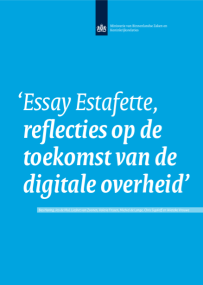Recently I wrote an essay at the invitation of the Dutch Ministry of the Interior and Kingdom Relations (BZK). In the essay (Dutch), I argue that the lack of appealing narratives about smart cities is one of the reasons why citizen engagement is still such a big unresolved question. I discuss two emerging alternative narratives that indeed do put people in a central role as agents: the hackable city and the playful city.
The essay is included in the booklet “Essay Estafette, reflecties op de toekomst van de digitale overheid”. It contains other essays about ICTs, government and citizens, by Bas Haring, Jos de Mul, Liesbet van Zoonen, Valerie Frissen, Chris Sigaloff & Wieteke Vrouwe.
Download the booklet >> (1,8 MB)
Unfortunately, some of the footnotes have been culled in the pdf. Below the full list:
- Zie onder meer: Ricoeur, Paul. 1992. Oneself as another. Chicago: University of Chicago Press.
- Zie Lievrouw, Leah A., and Sonia M. Livingstone. 2006. Handbook of new media: social shaping and social consequences of ICTs. Updated student ed. London: SAGE, p.2.
- Zie “IBM Smarter Cities Intelligent Operations Center 1.6 Demo” https://www.youtube.com/watch?v=3yVe1DL2qjs.
- Een bekende vertolker van die gedachte is Nicolas Carr die in artikelen en boeken de vraagt opwerpt of het internet onze cognitieve capaciteiten aantast. Zie o.a.: Carr, Nicholas. 2010. The shallows: what the Internet is doing to our brains. 1st ed. New York: W.W. Norton.
- O.a. “The stupefying smart city” (2012) https://lsecities.net/media/objects/articles/the-stupefying-smart-city/en-gb/; “No one likes a city that’s too smart” (2012) http://www.theguardian.com/commentisfree/2012/dec/04/smart-city-rio-songdo-masdar; zie ook https://www.youtube.com/watch?v=UPtrxAN2RnY.
- Greenfield, Adam. 2013. Against the smart city (The city is here for you to use Book 1). New York: Do Projects, met name hoofdstuk 13.
- Zie: Prins, Baukje, ed. 2013. Superdivers! Alledaagse omgangsvormen in de grootstedelijke samenleving. Delft: Eburon/De Haagse Hogeschool.
- Cohen, Boyd. 2015. The 3 Generations Of Smart Cities: inside the development of the technology driven city”. http://www.fastcoexist.com/3047795/the-3-generations-of-smart-cities.
- Over eigenaarschap en het betrekken van burgers bij de slimme stad zie o.a.: de Lange, Michiel, and Martijn de Waal. 2011. “Ownership in de Hybride Stad.” http://virtueelplatform.nl/g/content/download/virtueelplatform-ownershipindehybridestad-2011.pdf; de Lange, Michiel, and Martijn de Waal. 2013. “Owning the city: new media and citizen engagement in urban design.” First Monday 18 (11).
- Evgeny Morozov bijvoorbeeld waarschuwt tegen “solutionisme”, het idee dat technologie vanzelfsprekende frictieloze oplossingen biedt voor complexe problemen: Morozov, Evgeny. 2013. To save everything, click here: the folly of technological solutionism. New York: PublicAffairs.
- Zie VenhoevenCS architecture+urbanism. 2014. Smart Cities NL: verkenning naar kansen en opgaven. http://issuu.com/tonvenhoeven/docs/smart_cities_nl_venhoevencs, p. 7.
- Zie o.a. de International Telecommunication Union (ITU) focusgroep Smart Sustainable Cities http://www.itu.int/en/ITU-T/focusgroups/ssc/Pages/default.aspx; Smart Cities EU http://www.smart-cities.eu/benchmarking.html; het adviesbureau Smart Cities Council http://smartcitiescouncil.com/resources/smart-cities-best-best; of de European Digital Cities index ontwikkeld door NESTA http://digitalcityindex.eu.
- Söderström en zijn collega’s wijzen op de utopische retoriek van technologiebedrijven in hun verhalen over de smart city en de achterliggende financiële belangen: Söderström, Ola, Till Paasche, and Francisco Klauser. 2014. “Smart cities as corporate storytelling.” City no. 18 (3):307-320. Zie als contrast in deze discussie: Shelton, Taylor, Matthew Zook, and Alan Wiig. 2015. “The ‘actually existing smart city’.” Cambridge Journal of Regions, Economy and Society no. 8 (1):13-25..
- Zie o.a.: de Lange, Michiel. 2015. “Een echte slimme stad is een speelse stad.” Parool, 30 May 2015. http://bit.ly/1crakLg.
- Zie: Ryan, Marie-Laure. 2001. Narrative as virtual reality: immersion and interactivity in literature and electronic media. Baltimore: Johns Hopkins University Press, p.15.
- Zie eveneens: Townsend, Anthony. 2013. Smart cities: big data, civic hackers, and the quest for a new utopia. First edition. ed. New York: Norton; Gardner, Edwin. 2014. Hack de stad. Rekto:verso (63). Available from http://www.rektoverso.be/artikel/hack-de-stad.
- Zie http://www.buiksloterham.nl.
- Zie o.a. http://nos.nl/artikel/705682-weken-kamperen-voor-een-kavel.html.
- Bron: interview Marjan de Blok, 11 maart 2015. Zie ook http://www.schoonschipamsterdam.org/ontstaan-en-onderzoek.
- Bron: interview met Yvonne Franquinet, 21 mei 2015.
- Voor een eloquente kritiek zie: Morozov, Evgeny. 2013. To save everything, click here: the folly of technological solutionism. New York: PublicAffairs.
- Zie onder meer Levy, Steven. 2010. Hackers: heroes of the computer revolution. 25th anniversary ed. ed. Beijing ; Farnham: O’Reilly.; Himanen, Pekka. 2001. The hacker ethic, and the spirit of the information age. 1st ed. New York: Random House.
- Zie onder meer de Lange, Michiel. 2015. “The Playful City: Using Play and Games to Foster Citizen Participation.” In Social Technologies and Collective Intelligence, edited by Aelita Skaržauskienė, 426-434. Vilnius: Mykolas Romeris University.; de Lange, Michiel. 2013. Rezone the game: playing for urban transformation. http://www.bijt.org/wordpress/2013/04/24/rezone-the-game-playing-for-urban-transformation.; de Lange, Michiel. 2012. “Stad, spel, media: spelenderwijs eigenaar worden van je stad.” In Balkan in de polder: naar organische gebiedsontwikkeling in Nederland?, edited by Ellen Holleman, Robert-Jan de Kort and Sabrina Lindemann, 78-82. Amsterdam: Mondriaanfonds.
- Ik was betrokken bij Rezone. Zie: de Lange, Michiel. 2013. Rezone the game: playing for urban transformation. http://www.bijt.org/wordpress/2013/04/24/rezone-the-game-playing-for-urban-transformation.
- Zie Huizinga, Johan. 2008 (1950). Homo ludens: Proeve eener bepaling van het spel-element der cultuur. Amsterdam: Amsterdam University Press. http://dare.uva.nl/aup/nl/record/301883.
- Op allerlei manieren wijzen theoretici op de gelaagdheid van mediatechnologieën, zoals reception/operation, interface, form/function, code, platform (zie http://platformstudies.com/levels.html); of Benjamin Bratton’s onderscheid tussen Earth, Cloud, City, Network, Address, Interface, User, in zijn te verschijnen boek The Stack: On Software and Sovereignty (2016).
- Zie S+RO. 2013. Big Data, Different City. http://www.pbl.nl/sites/default/files/cms/publicaties/PBL_2013_Big-Data-Different-City_1360.pdf.
- “Wat is er publiek aan de numerieke stad? Big Data, smart cities en algoritmische publieken” http://www.platform31.nl/ruimte/agenda-stad/filosofen-agenderen-de-stad/filosofen-agenderen-de-stad-big-data-en-de-stad.
- Zie “De stad is (g)een algoritme” http://www.platform31.nl/ruimte/agenda-stad/filosofen-agenderen-de-stad/filosofen-agenderen-de-stad-algoritme.


